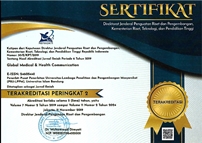Effect of Training on Organic Waste Management in Neighborhoods of Pejanggik, Mataram, West Nusa Tenggara
Abstract
Garbage is solid waste consisting of organic and inorganic substances that outlived their usefulness and must be adequately managed to prevent environmental harm. The amount and types of waste are strongly influenced by the lifestyle and the type of materials we consume, and increasing household income cause an increase in the variety of waste generated. Handling and managing organic waste requires community involvement and successful household organic waste management, contributing significantly to the zero waste program. This study aims to measure the effect of waste management training on knowledge and principles of reducing, reusing, and recycling in waste management. The study was conducted from April to June 2021 in the neighborhoods around Pejanggik, Mataram village, West Nusa Tenggara province. It is a pre-experimental study involving 50 households to analyze the effects of the waste management training provided using a one-group pretest-posttest method. Before the training, knowledge and waste management principles were 22 of 50 respondents and 32 of 50 respondents, respectively. After the provision of training, the increase in knowledge and waste management principles reached 50 of 50 respondents. In conclusion, the training activity shows increased knowledge and waste management principles in households involved. Waste processing with reduce, reuse, and recycle principles can help overcome household waste problems and convert waste into products with increased economic value. Therefore, we recommend that periodic community-based waste management training involving households be held to overcome increased organic waste in households.
Keywords
Full Text:
PDFReferences
Mak TMW, Xiong X, Tsang DCW, Yu IKM, Poon CS. Sustainable food waste management towards circular bioeconomy: policy review, limitations and opportunities. Bioresour Technol. 2020;297:122497.
Istiqomah N, Mafruhah I, Gravitiani E, Supriyadi S. Konsep reduce, reuse, recycle dan replace dalam pengelolaan sampah rumah tangga di Desa Polanharjo Kabupaten Klaten. SEMAR. 2019;8(2):30–8.
Vaneeckhaute C, Fazli A. Management of ship-generated food waste and sewage on the Baltic Sea: a review. Waste Manag. 2020;102:12–20.
Dinas Lingkungan Hidup Kota Mataram. Data persampahan: penanganan dan pengurangan. Mataram: Dinas Lingkungan Hidup Kota Mataram; 2021.
Wahyudin, Fitriah, Azwaruddin. Perencanaan pengelolaan sampah di Pasar Dasan Agung Kota Mataram dengan pendekatan reduce, reuse dan recycle (3R). J Serambi Eng. 2020;5(2):1079–89.
Yunik’ati, Imam RM, Hariyadi F, Choirotin I. Sadar pilah sampah dengan konsep 4R (reduce, reuse, recycle, replace) di Desa Gedongarum, Kanor, Bojonegoro. JIPEMAS. 2019;2(2):81–7.
Widiarti IW. Pengelolaan sampah berbasis “zero waste” skala rumah tangga secara mandiri. J Sains Teknol Lingkung. 2012;4(2):101–13.
Sulistyani AT, Wulandari Y. Proses pemberdayaan masyarakat Desa Sitimulyo Kecamatan Piyungan Kabupaten Bantul dalam pembentukan kelompok pengelola sampah mandiri. J Pengabdi Kpd Masy. 2017;2(2):146–62.
Asteria D, Heruman H. Bank sampah sebagai alternatif strategi pengelolaan sampah berbasis masyarakat di Tasikmalaya. J Mns Lingkung. 2016;23(1):136–41.
Undang-Undang Republik Indonesia Nomor 18 Tahun 2008 tentang Pengelolaan Sampah.
Supriyanto D, Effendi MY, Rohmah AI, Salamah D, Kholidah D, Ningsih HYA, et al. Pengelolaan sampah berbasis masyarakat melalui tempat pengolahan sampah reduce, reuse, recycle (TPS3R) di Desa Purwojati, Kecamatan Ngoro, Kabupaten Mojokerto. J Aksi Afirmasi. 2021;2(2):1–11.
Nurfaida, Mustari K, Dariati T. Penerapan prinsip 3R (reduce, reuse dan recycle) dalam pengelolaan sampah melalui pembuatan pupuk organik cair di Perumahan Kampung Lette Kota Makassar. JDP. 2015;1(1):24–37.
Suryatmaja IB, Nada IM, Widnyana IK, Sumantra IK, Anom IGN. Manajemen sampah berbasis pengelolaan sampah mandiri di masyarakat [Internet]. San Francisco: Academia; 2016 [cited 2022 January 20]. Available from: https://www.academia.edu/21940230/manajemen_sampah_berbasis_pengelolaan_sampah_mandiri_di_masyarakat.
Subekti S. Pengelolaan sampah rumah tangga 3R berbasis masyarakat. Pros SNST. 2010;1(1):I.24–30.
Ruhmawati T, Karmini M, Pudjowati DT. Peningkatan pengetahuan dan sikap kepala keluarga tentang pengelolaan sampah melalui pemberdayaan keluarga di Kelurahan Tamansari Kota Bandung. JKLI. 2017;16(1):1–7.
Yang H, Ma M, Thompson JR, Flower RJ. Waste management, informal recycling, environmental pollution and public health. J Epidemiol Community Health. 2018;72(3):237–43.
Bernardo EC. Solid-waste management practices of households in Manila, Philippines. Ann NY Acad Sci. 2008;1140:420–4.
Esparza I, Jiménez-Moreno N, Bimbela F, Ancín-Azpilicueta C, Gandía LM. Fruit and vegetable waste management: conventional and emerging approaches. J Environ Manage. 2020;265:110510.
Matsuto T. A comparison of waste management throughout Asian countries. Waste Manag. 2014;34(6):969–70.
Setianingrum RB. Pengelolaan sampah dengan pola 3 R untuk memperoleh manfaat ekonomi bagi masyarakat. Berdikari. 2018;6(2):173–83.
Larasati N, Laila F. Analisis sistem pengelolaan sampah organik di Universitas Indonesia (studi kasus efektivitas Unit Pengolahan Sampah UI Depok). J Nas Kesehat Lingkung Glob. 2020;1(2):85–92.
Riswan, Sunoko HR, Hadiyarto A. Pengelolaan sampah rumah tangga di Kecamatan Daha Selatan. J Ilmu Lingkung. 2011;9(1):31–8.
Yuniwati M, Iskarima F, Padulemba A. Optimasi kondisi proses pembuatan kompos dari sampah organik dengan cara fermentasi menggunakan EM4. J Teknol. 2012;5(2):172–81.
Singh A, Kumari K. An inclusive approach for organic waste treatment and valorisation using Black Soldier Fly larvae: a review. J Environ Manage [Internet]. 2019;251:109569.
Hernawati D, Saleh C, Suwondo. Partisipasi masyarakat dalam pengelolaan sampah berbasis 3R (reduce, reuse dan recycle) (studi pada tempat pengelolaan sampah terpadu di Desa Mulyoagung Kecamatan Dau Kabupaten Malang). JAP. 2013;1(2):181–7.
Ediana D, Fatma F, Yuniliza. Analisis pengolahan sampah reduce, reuse, dan recycle (3R) pada masyarakat di Kota Payakumbuh. J Endurance. 2018;3(2):238–46.
Armanda E. Perencanaan tempat pengolahan sampah dengan prinsip reduce, reuse, recycle (TPS 3R) Kecamatan Medan Polonia [undergraduate thesis]. Medan: Universitas Sumatera Utara; 2019.
DOI: https://doi.org/10.29313/gmhc.v10i2.8853
pISSN 2301-9123 | eISSN 2460-5441
Visitor since 19 October 2016:
Global Medical and Health Communication is licensed under a Creative Commons Attribution-NonCommercial-ShareAlike 4.0 International License.






























.png)
_(1).png)
_(1).jpg)
